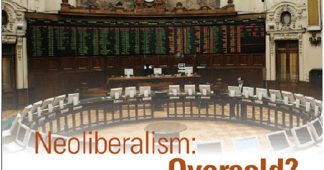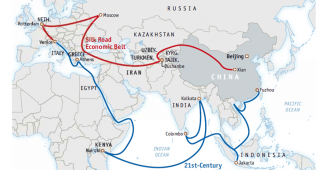By Maurice Allais : Nobel Prize in economics
Speech given at the UNESCO April 10th 1999
During the last fifty years, all the research I have done, all the thoughts that events have inspired in me, all the experience I have gained, have continually reinforced in me the conviction that a society founded on the decentralization of decision-making, on the market economy and on private property is not the best form of society we could dream of in an ideal world in purely abstract terms, but a society which, in concrete terms of reality, both from the point of view of economic analysis and of past experiences, proves to be the only form of society which could best answer the fundamental problems of our time.
But although I have become more and more convinced over the years of the immense superiority of an economically liberal and humanist society, I have another conviction, just as strong, which is that today our society is under threat, particularly because of the ignorance of the fundamental principles that the setting up of a liberal and humanist society involves. In fact, living together implies for the whole of society a deep consensus of what is essential. If this consensus does not exist, the creation of a humanist society seems to be compromised.
In the final analysis, the economic organization of life in a society raises five fundamental questions. How do we guarantee the efficiency of the economy and at the same time a distribution of income that is commonly acceptable? How do we guarantee for everyone conditions that are favorable to the uninhibited development of our personalities and offer at every level, effective advancement of the most capable, whatever their origins? How do we make the changes that are associated with the functioning of the economy socially and humanely acceptable? How do we protect the economy from all external disruptions whatever they are? How do we define an institutional framework that is really appropriate on both a national and international level to achieve these objectives?
The establishment of a humanist society is seriously compromised if the functioning of the economy generates too many unwarranted earnings and causes unemployment, if social advancement is insufficient and if unfavorable conditions oppose the development of individuality, if the economic environment is too unstable, and finally if the institutional framework of the economy is inappropriate.
Today’s major question is of course massive underemployment (approximately six million people in France, if we include those, in increasing numbers, benefiting from basic social income). This massive underemployment completely distorts the distribution of incomes and considerably reduces social mobility and social advancement. It creates unacceptable insecurity, not only for those who do not have regular employment, but also for millions of others whose jobs are dangerously threatened. It gradually damages the social fabric. This situation is economically, socially and ethically unacceptable in all respects. This unemployment is the cause of the development of aggressive, violent and riotous criminality everywhere and the State no longer seems capable of guaranteeing the safety, of either material goods or of people, one of its major obligations.
Extra-community immigration also undermines the very foundations of social cohesion, a major condition for the efficient and just functioning of the market economy. As a whole, this situation creates deep discontent everywhere and generates all the conditions that sometime in the future, will seriously compromise public order and even the survival of our society. The situation today is certainly more serious than in 1968 in France when unemployment, which was then less than 600,000, was practically inexistent but public order nevertheless almost collapsed.
Unemployment is a very complex phenomenon and has many different causes, which when analyzed can be classified for the most part into five fundamental factors:
- Chronic unemployment caused on a national level, independent of external trade, by social protection procedures;
- Unemployment caused by global free exchange and an international monetary system which generates imbalance;
- Unemployment caused by extra-community immigration;
- Technological unemployment;
- Conjectural unemployment.
In fact, the major cause of unemployment today is the global liberalization of exchange in a world that is characterized by considerable disparities in real salaries. These adverse effects are aggravated by the system of floating exchange rates, the total deregulation of the movements of capital, and “monetary dumping” by many countries following undervaluation of their currencies. This unemployment of course has only been able to develop because of the existence of low salaries and insufficient flexibility in the labor market. But to neutralize the effects on unemployment of globalist free exchange and the factors that are associated with it, we would have to accept a considerable reduction of salaries for the least qualified workers. The effects of globalist free exchange are not only limited to a massive increase in unemployment. They also mean an increase in inequality, a progressive destruction of the industrial fabric and a considerable slowing-down in the increase of living standards.
All the economic factors that today compromise the survival of our society are a result of erroneous policies, pursued for twenty-five years within an inappropriate institutional community by successive governments of all parties. The European Union’s trade policy has gradually drifted towards a globalist free exchange policy, contrary to the very idea of the constitution of a real European Community. With regard to the considerable disparities of real salaries in different countries, the globalist policy, combined with the system of floating exchange rates and the total deregulation of the movements of capital, can only cause instability and unemployment everywhere.
The European Union’s policy, which is becoming more and more globalist, has perhaps contributed momentarily to the development of certain countries, but it has caused the exporting of our jobs and the importing of their underemployment. This movement has been reinforced by the growing influence of all those who gain from the insane globalization of the economy, and of the powerful news media they control.
In fact, the total liberalization of exchange and the movements of capital is only possible or desirable within the framework of regional entities which group together countries that are economically and politically associated, with comparable economic and social development, at the same time ensuring a market that is a wide enough to allow competition to develop efficiently and constructively. Each regional organization must be able to set up, within an appropriate institutional, political and ethical framework, reasonable protection from the outside. This protection must have two objectives:
- Avoid unwarranted distortion of competition and the adverse effects of external disruptions
- Make undesirable specializations impossible – specializations that unnecessarily cause imbalance and unemployment, a condition that totally opposes the establishing of a situation of maximum efficiency on a world scale and the international distribution of income that is commonly acceptable within a liberal and humanist framework.
As soon as we defy these principles, insane and anarchic globalization becomes a destructive blight wherever it is found. Correctly formulated, the theories of maximum efficiency and of compared costs constitute irreplaceable instruments for action, but, if they are misunderstood and badly applied, they can lead to disaster.
According to current opinion, unemployment in western economies is essentially the result of real salaries that are too high and insufficiently flexible, of the speed of technological progress in the information and transport sectors, and of a monetary policy that is judged to be unjustifiably restrictive. For all major international organizations, unemployment in developed countries is due to their inability to adapt to new conditions that are inevitably imposed on them by globalization. This adaptation demands that the cost of salaries be reduced, and particularly the salaries of the least qualified. According to all these organizations, free exchange is bound to create jobs and increase living standards. Competition from countries where salaries are low cannot be considered as a cause of growing unemployment and the future of all countries is conditioned by the international development of generalized free trade. In fact, these assertions have been constantly denied by economic analysis as well as by observation data. The reality is that globalization is the major cause of massive unemployment and inequalities that continue to develop in most countries.
All strategies for European construction and all international economic treaties, such as the General Agreement on Tariffs and Trade, 1947, and the December 1960 convention concerning the Organization for Economic Cooperation and Development, were contradicted by a proposition taught and unquestionably accepted in all American universities and later in all the universities in the world: “free and spontaneous functioning of the market leads to optimal allocation of resources”. This is the basis of all free exchange doctrines, whose blind application without reserve on a world scale has caused chaos and misery of all kinds everywhere.
However, this proposition, which has been unquestionably accepted, is totally wrong and merely shows the total ignorance of economic theory of those who have taught it as an established fundamental and definitive acquisition of economic science. This proposition is based essentially on the combination of two entirely different concepts: the concept of maximum efficiency of the economy and the concept of optimal distribution of income.
In fact there is not only one situation of maximum efficiency, but countless such situations. Economic theory enables us to define, without ambiguity, the conditions of maximum efficiency, that is to say a situation on the borderline between possible situations and impossible situations. However, by itself, it does not enable us in any way to define, among all the situations of maximum efficiency, the one we should consider to be preferable. This choice can only be made according to ethic and political considerations relative to the distribution of incomes and the organization of society. In addition, it is not even proven that from an initial given situation free functioning of the markets can lead the world to a situation of maximum efficiency. Never before have theoretical errors had so many adverse consequences.
Confronted with the current development of massive unemployment and in the absence of any justifiable diagnosis, so-called remedies continue to proliferate :
For example it is said that it is enough just to reduce working time to fight unemployment, but apart from the fact that men cannot be perfectly substituted for each other, a solution such as this totally ignores the indisputable fact that too many, often very urgent, needs remain unsatisfied. The remedy for this is not just to work less. Reducing working time would in any case imply a reduction in income, which would have to be compensated for by resources obtained from increased taxes.
It is still maintained that it is the inflated real interest rates that explain the economic crisis and the massive unemployment we are experiencing, but actually the considerable reductions over recent years of real interest rates have led to no significant recovery. In fact, whether it is a question of unemployment due to globalist free exchange or of unemployment due to extra-community immigration, the situation cannot be remedied by inflation. Fighting for example the effects of globalist free exchange by monetary expansion is pure illusion and is the result of a deep ignorance of the real causes of the current situation.
We are also told that it is all very simple. If we want to get rid of unemployment, we merely have to reduce salaries, but nobody tells us what this reduction should amount to, or whether it would be effectively feasible to do this without risking social peace, or what its many implications would be in the production process.
It is still maintained that China, a country of low-paid workers, is going to specialize in activities with low added value, whereas developed countries, like France, are going to specialize more and more in high technology. But, this means totally ignoring the work capacities and the intelligence of the Chinese people will be totally ignored. If we continue to put up with these absurdities, we are heading for disaster.
How can we explain such attitudes? In fact, essentially, they can be explained by the domination and the incessant repetition of “accepted truths”, acknowledged taboos and incorrect prejudices, that are unquestionably accepted, whose “adverse effects” have multiplied and built up over the years. Nobody wants to accept this evidence: if all the policies set up over the last twenty-five years have failed, it is because we have constantly refused to tackle the root of the problem, excessive world liberalization of exchange and the total deregulation of the movements of capital. Some maintain that we can establish a new world order on the total liberation of the movement of goods, capital and even people. It is believed that free functioning of all markets would automatically lead to prosperity for each country in a world liberated from economic boundaries. In truth, the new order, which is thus proposed to us, is deprived of any real regulatory system; in substance, it is laissez-fairism.
This evolution is associated with the growth of multinational companies, each one with hundreds of subsidiaries, free from any control, and it too often deteriorates into the development of fierce and immoral capitalism. In the name of so-called liberalism and with the increase of deregulations, a kind of globalist laissez-fairist chaos has been created. And this means we have forgotten that the market economy is not just an instrument and cannot be dissociated from its institutional, political and ethical context. The market economy can only be efficient if it is part of an appropriate institutional, political and ethical framework, and a liberal society is not and cannot be an anarchic society.
We are often told that ethical conditions are incompatible with the search for maximum economic efficiency. But this is not true. In fact, the fundamental objective of any liberal and humanist society is to allow people to live together in conditions that ensure mutual respect and living conditions that are as good as they can possibly be. There is nothing here that is incompatible with the research of economic maximum efficiency. Liberalism must not be reduced to economic laissez-fairism: it is above all a political doctrine and the economy is only a means to allow this political doctrine to be applied efficiently. Originally, in fact, there was no contradiction between the aspirations of socialism and those of liberalism. The current confusion of liberalism and laissez-fairism constitutes one of the greatest dangers of our time.
Globalization of the economy is certainly very profitable for some privileged groups. But the interests of these groups cannot be identified with those of the whole of humanity. Hasty and anarchic globalization can only cause unemployment, injustice, disorder and instability everywhere, and in the end, will inevitably be a disadvantage for the whole of mankind. It is not inevitable, necessary or desirable. It would be conceivable only if it were preceded by world political unity, comparable development of different economies and the establishment of an appropriate world institutional and ethical framework, conditions that obviously are not and cannot be currently met.
For two decades, a new doctrine has gradually been imposed, the doctrine of globalist free exchangism, implying the disappearance of all obstacles to the free movement of goods, services and capital. According to this doctrine, the elimination of all obstacles to these movements was a necessary and sufficient condition for the optimal distribution of resources on a world scale.
All countries, and all social groups in each country should have seen an improvement in their situation. For all developing countries, their complete opening-up to the outside world was a necessary condition for progress and the proof of this, it was said, was the extremely rapid progress of emerging countries in Southeast Asia. For developed countries, the abolition of all tariff or other barriers was considered as a condition for growth, as was shown by the uncontested success of the East Asian monsters, and it was again repeated, that the West should follow their example in order to experience unprecedented growth and full employment. In particular Russia and the ex-communist countries of the East, Asian countries, and above all China, were major growth areas, offering the West unprecedented opportunities for development and riches.
This basically was the doctrine that gradually became imposed worldwide and was considered to be the beginning of a new golden age at the dawn of the 21st century. This doctrine has been the undisputed creed of all major international organizations over the last two decades. All these convictions ended up being swept away by the serious crisis that developed from 1997 in Southeast Asia, then in Latin America, and finally in Russia in 1998, implicating banking establishments and the American and European stock exchanges in September 1998.
Two major factors played a decisive role in this world crisis, the extent of which had not been seen since the 1929 crisis: the potential instability of the world financial and monetary system and globalization of the economy both on a monetary and real level. What will be will be: world economy, which was deprived of any real regulatory system and which had developed within an anarchic framework, could only lead, sooner or later, to major difficulties. The new doctrine collapsed, as it was bound to collapse. Proof of the facts finally conquered doctrinal incantations.
The dominant hostility today against all forms of protectionism is founded on the incorrect interpretation of the fundamental causes of the Great Depression. In fact, the cause of the Great Depression of 1929-1934, which from the United States spread worldwide, was purely monetary and resulted from the structure and the excesses of the credit mechanism. The chain of protectionism in the 1930s was only a consequence and not a cause of the Great Depression. It was merely an attempt by national economies everywhere to protect themselves from the destabilizing consequences of the Great Depression.
Obstinate adversaries to any protectionism, whatever it may be, commit a second error: not seeing that a market economy can function correctly only within an institutional, political and ethical framework that can ensure stability and regulation. As the world economy has currently no real regulatory system, is developing within an anarchic framework, and takes no account of any external costs it generates, the random opening-up onto international markets of national economies or regional associations not only has no real justification, but can only lead to major, even insurmountable problems.
The real foundations of protectionism, its major justification and its necessity, is the essential protection against disorders and difficulties caused by the absence of any real regulatory system on a world scale. In fact, the real choice is not between the absence of any protection and protectionism that totally isolates each national economy from the outside. It is the search for a system that can allow each regional economy to benefit from effective competition and the advantages of multiple exchanges with the outside world, but one that can also protect it against all disorders and malfunctioning that characterize the world economy every day.
Indisputably, the policy of globalist free exchange set up by the European Union is by far the major cause of the massive underemployment we are experiencing today. To remedy this problem, European construction should be based on community preference, which is a real condition for expansion, employment and prosperity. This principle is in fact universally valid for all countries or groups of countries. For any regional economy, a reasonable objective would be that, by the appropriate measures and for each product or group of products, a minimum percentage of community consumption is assured by community production, at the exclusion of all delocalization. The average percentage could be around 80%. This, in view of the current situation, is a measure that is fundamentally liberal and would allow the efficient functioning of any community economy shielded from outside disorders, while at the same time assuring extended and beneficial links with other countries. This is a major condition for development in developed countries, but it is above all a major condition for development in underdeveloped countries.
The haphazard opening-up of the European economy in a global framework that is fundamentally unstable, distorted by considerable disparities of salaries, by the system of floating exchange rates and by the absence of all social and ethical concern, is the essential cause of the serious crisis that continues to worsen. The facts, like the theory, show us that if the European Union’s present globalist policy continues, it is bound to fail. Today’s crisis is above all an intelligence crisis. The current situation cannot last. It is useless to remedy only the effects: it is the causes that must be tackled.
Without question, the major issue today is underemployment which, for years, has risen above an acceptable and tolerable level, the fundamental causes of which remain more or less voluntarily hidden, or unknown. This will lead inevitably to a social explosion and could even threaten the survival of our society. In the final analysis, within a framework of a liberal and humanist society, it is man and not the State who constitutes the final objective and is the essential concern. This objective must come before anything else. A liberal and humanist society cannot be identified with a laxist, laissez-fairist, corrupted, manipulated or blind society.
As for the construction of European, it is not in keeping with the ideas of liberalism and humanism to substitute citizens’ needs, as they themselves see them according to their own scale of values, with “their alleged needs” chosen by others, politicians, technocrats or economic leaders, however powerful they may be. In reality, the globalist economy, presented to us as a universal remedy, has only one goal: “money”. It has only one cult: “money”. With no consideration for ethics, it will certainly destroy itself. History has given us too many examples of societies that have collapsed because they could not conceive or set up conditions for their survival. The corruption of socialism has been the cause of the collapse of societies in the East. But the laissez-fairist corruption of so-called liberalism is leading us to the collapse of our society.











